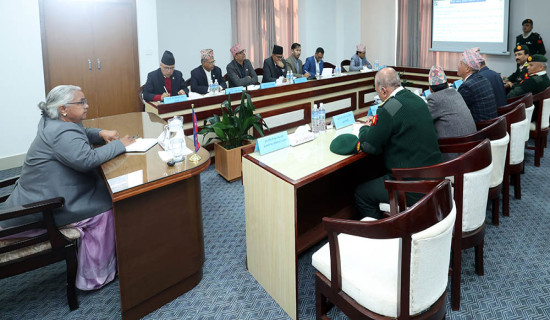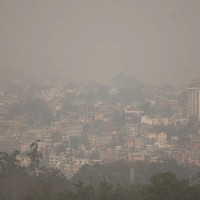- Thursday, 19 February 2026
Protecting Women’s Rights And Dignity
From November 25th, the International Day for the Elimination of Violence Against Women, to December 10th, Human Rights Day, the world observes 16 days dedicated to activism against gender-based violence. During this critical period, it is imperative to explore the often-overlooked intersection of climate change and violence against women, particularly in vulnerable regions such as South Asia. Climate-resilient sanitation, a solution frequently sidelined, emerges as a powerful tool—not just as infrastructure but as a means to safeguard dignity, reduce risks, and address structural inequalities exacerbated by the climate crisis.
As the climate crisis accelerates, its disproportionate impact on women and girls becomes increasingly apparent. In South Asia, a region marked by socio-economic vulnerabilities, the compounded effects of rising sea levels, frequent flooding, glacial melt, and extreme weather events have caused widespread disruptions. Women, particularly those from marginalised and impoverished communities, bear the brunt of these challenges, often facing heightened risks of violence in the wake of climate-induced disasters.
Inadequate sanitation facilities play a significant role in exacerbating these risks. Floods in countries like Bangladesh force women to travel farther to fetch clean water and access sanitation, exposing them to harassment and physical assault. Disasters push families into temporary shelters or refugee camps, which frequently lack proper sanitation facilities, leaving women vulnerable to sexual violence due to inadequate lighting, privacy, or secure access. Health risks such as urinary tract infections (UTIs), resulting from open defecation or unsafe sanitation practices, further compromise women’s dignity during emergencies. A UN Women study revealed that during disasters in South Asia, nearly one in three women reported experiencing some form of violence. In cyclone-affected areas of Bangladesh, surveys have shown that 62% of women lacked safe sanitation access, significantly increasing their risk of violence.
This disproportionate burden highlights the stark injustice of unequal responsibility. Developed nations, historically the largest contributors to greenhouse gas emissions, bear significant responsibility for the climate crisis. However, their efforts to address its impacts in the global South have often fallen short. South Asia, despite contributing less than 10% of global emissions, faces some of the most devastating effects of climate change. Millions of women in Nepal, India, Bangladesh, and Sri Lanka are forced to navigate the dual burden of poverty and vulnerability to disasters, yet the gendered impacts of these crises remain under-represented in global platforms such as the United Nations Framework Convention on Climate Change (UNFCCC) and the Conference of the Parties (COP).
Data from the Organisation for Economic Cooperation and Development (OECD) highlights this disparity. While approximately 34% of bilateral climate-related development finance integrates gender considerations, only 3% of this finance specifically identifies gender equality as the principal objective. Within this fraction, sanitation rarely features prominently, perpetuating cycles of inequality as women in the global South continue to face disproportionate risks.
Amid these challenges, climate-resilient sanitation systems offer a viable and transformative solution. Designed to withstand environmental shocks while addressing specific needs related to safety, privacy, and accessibility, such systems can significantly reduce the risks faced by women and girls in vulnerable communities. In low-lying areas of Bangladesh and Nepal, flood-resistant toilets, elevated and sealed to function during flooding, have been successfully implemented. These structures prevent contamination while ensuring continuous access to safe sanitation, mitigating both health risks and exposure to violence.
Community-led design approaches also play a pivotal role in ensuring the effectiveness of sanitation systems. Involving women and marginalised communities in planning ensures facilities meet specific safety and privacy needs. In Nepal, for example, the Environment and Public Health Organisation (ENPHO) has constructed raised toilets in flood-prone regions with direct input from local women. Similarly, ecological sanitation systems in drought-affected areas of India reuse wastewater for irrigation, addressing water scarcity while promoting sustainable practices.
In the flood-prone Terai region of Nepal, a partnership between government agencies and NGOs like ENPHO has led to the construction of over 3,000 raised toilets. This initiative has not only improved access to safe sanitation but also reduced incidences of harassment and assault during floods. Women who were previously forced to seek privacy in unsafe, open spaces now report feeling safer and more dignified.
The International Day for the Elimination of Violence Against Women underscores the inseparable nature of climate justice and gender justice. Developed nations must take greater responsibility for addressing the intertwined crises of climate change and gender-based violence. This requires prioritising investments in gender-responsive sanitation systems. By allocating significant funds to projects that integrate climate-resilient and gender-sensitive sanitation solutions, developed nations can demonstrate a meaningful commitment to these issues.
Expanding financial support for vulnerable regions is also crucial. Mechanisms such as the Green Climate Fund must prioritise regions like South Asia, channelling increased financing into gender-focused adaptation projects. Empowering women’s leadership in climate discussions is another vital step. Women from affected communities bring lived experiences and resilience-building expertise that are invaluable in shaping inclusive solutions. Cross-border collaboration to share successful models of climate-resilient sanitation can further accelerate progress. Flood-resistant designs pioneered in Bangladesh, for example, could be adapted for similar challenges in other regions.
National and international climate policies must integrate gender equity with clear accountability measures to address the unique vulnerabilities of women and girls. The 16 Days of Activism Against Gender-Based Violence provide a platform for advocating for gender-sensitive approaches in climate policies. By aligning these efforts with global observances like World Toilet Day, stakeholders can amplify the call for climate-resilient sanitation as a critical component of gender equity.
The link between climate change and violence against women demands integrated solutions. Developed nations must move beyond symbolic gestures and take concrete actions, not only meeting climate finance commitments but also ensuring these resources address the most vulnerable populations. Initiatives like the Paris Agreement’s Loss and Damage Fund must prioritise gender-specific vulnerabilities, ensuring women are not left behind in the pursuit of climate justice.
Violence against women and climate change are not separate crises but deeply interconnected issues, driven by systemic inequities that demand urgent, holistic solutions. Climate-resilient sanitation is more than a technical intervention; it is a vital step toward safeguarding women’s dignity, reducing their vulnerability to violence, and building a more equitable future.
As the world observes the International Day for the Elimination of Violence Against Women, it must serve as a rallying cry for collective action. Developed nations must acknowledge their role in perpetuating these injustices and commit to rectifying them. By prioritising gender-responsive, climate-resilient sanitation, we can take a significant step toward ensuring that no woman’s safety or dignity is compromised by the dual threats of climate change and neglect. The time for action is now. Let us build a world where justice, equity, and resilience go hand in hand, leaving no one behind.
(The author is a social activist.)



-original-thumb.jpg)













